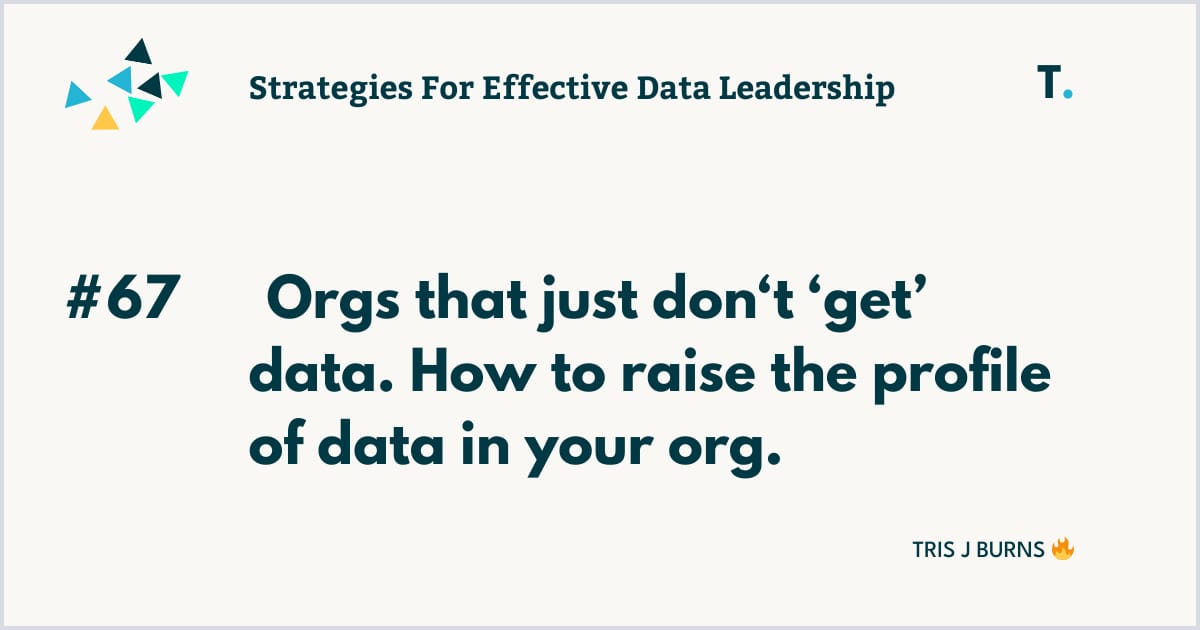
READ TIME: 5 MINUTES
Ever felt like your org doesn’t ‘get’ data?
I know I have. You spend time uncovering insights and discovering valuable opportunities and recommendations to share with the business. But despite your efforts, decision makers constantly overlook them, and teams continue to operate on intuition and gut feel rather than facts.
As a data leader, this can be an extremely frustrating dynamic to deal with.
Raising the profile of data isn’t just about internal selling. It’s about embedding data into the fabric of how the organisation thinks and operates. When done well, it leads to better decisions, stronger business performance, and an increased recognition of data’s value across the company.

You’re the captain of this ship!
The bitter pill to swallow here is that no one is coming to you rescue. As data leader, the responsibility falls to you to turn this ship around.
When data remains undervalued, it limits your ability to drive change and make an impact.
As always, let me know your thoughts in this week’s poll 👇🏻
What’s the biggest challenge you face when trying to raise the profile of data in your organisation?
🏠 Community Corner
I love the data community. It’s full of genuinely cool people who I love and respect. For that reason, each week I want to showcase great people in our community doing wonderful things.
I’m particularly interested in supporting any of you who have taken on entrepreneurial endeavours.
Here a few past examples of people I’ve mentioned in my community corner:
If you would like to be feature here in the future, please reach out to me to let me know!
Here’s what happens when companies don’t ‘get’ data:
1️⃣ Data teams become reactive rather than strategic
When data isn’t appreciated, teams end up stuck in service mode, constantly fulfilling ad hoc requests rather than proactively shaping strategy. Sound familiar?
2️⃣ Business decisions rely on instinct over insight
Without a strong data presence, decision-makers default to intuition, leading to inefficiencies, missed opportunities, and preventable risks.
3️⃣ Career growth stagnates
If leadership doesn’t see data’s value, it becomes harder for data professionals to secure resources, gain influence, and advance in their careers.
4️⃣ Data investments go underutilised
No matter how advanced your tech stack is, if people don’t trust or understand how to use data, your investments in tools and infrastructure won’t deliver their full potential.
The good news? You don’t have to accept this status quo. There are concrete ways to elevate data’s profile and ensure it’s seen as a critical asset to the business.
The Bad Ass Bookshelf is an online bookclub for leaders and aspiring leaders ready to learn, share, and level up with the best books on business, management, productivity, and personal development.
For the month of April, members have voted to read No Rules Rules - from Reed Hastings and Erin Meyer. The story of how Netflix’s culture helped it achieve untold success. We’re only halfway through this month so there is still time to get involved!
Oh and it’s free!
🧹 How to fix this mess!
The key to raising the profile of data isn’t just about ‘selling’ it. It’s about demonstrating its value in ways that matter to the business.
🪢 Tie data to business pain points
Leaders care about business outcomes. Instead of focusing on data quality or dashboards, show how data can solve pressing business problems like revenue growth, customer retention, or cost reduction.
📣 Speak the language of the business
Avoid technical jargon. Instead of talking about ‘data models’ or ‘ETL pipelines’ with business stakeholders, frame data discussions in terms of real-world business impact, like reducing churn or improving supply chain efficiency. That’s that they care about.
🏆 Find and empower internal champions
Identify influential stakeholders who already see the value in data and partner with them. When business leaders advocate for data-driven decision-making, it carries more weight. Become besties with these people and heap praise on them!
✨ Make data visible in day-to-day operations
Small, consistent nudges help normalise data-driven thinking. This could be as simple as adding key metrics to team meetings, setting up automated insights in Slack, or celebrating wins where data made a tangible difference. You can also try less subtle ways such as hosting talks or lunch and learns open to all.
🥇 Build a track record of quick wins
Start with small, impactful projects that showcase data’s value. Once you have proof points, use them to build momentum and increase buy-in for bigger initiatives. The first step here is to make sure you maintain a folder of your wins. You’ll never know when you’ll need it.
By taking these steps, you can shift how your organisation perceives and uses data—without feeling like you’re constantly fighting for attention. Over time, data will go from an afterthought to an essential driver of business success

Tristan Burns
💡 Helpful resources for data professionals:
The Data Leadership Frameworks: This email series containing 10 data leadership frameworks, will equip you with the necessary skills and knowledge to maximise your effectiveness and become the influential and powerful data leader you know you can be.
DIY Coaching Program: Through a series of 9 self-guided exercises, you’ll clarify your goals, overcome obstacles, and create a plan for your next career move - all at your own pace.
⚡️Three more ways I can help you:
Private Coaching for Data Leaders: I work with data professionals looking to grow into influential and unstoppable data leaders to help them navigate and overcome the challenges of being a data leader.
Group coaching for Data Teams: Great data teams can make or break businesses. Through my facilitated 6-week group coaching program, together we get to the heart of what is holding teams back and set a course for data-driven success.
Google Analytics, Tagging and Looker Support: Helping teams to set up or optimising their data eco system, generate actionable insights and gain more in-depth knowledge through training.
What did you think of this email?
If you enjoyed this newsletter, why not forward it to a friend.
Did someone forward you this email? You can subscribe to Strategies for Effective Data Leaders here!


